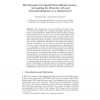Free Online Productivity Tools
i2Speak
i2Symbol
i2OCR
iTex2Img
iWeb2Print
iWeb2Shot
i2Type
iPdf2Split
iPdf2Merge
i2Bopomofo
i2Arabic
i2Style
i2Image
i2PDF
iLatex2Rtf
Sci2ools
161
click to vote
GISCIENCE
2010
Springer
2010
Springer
Microtheories for Spatial Data Infrastructures - Accounting for Diversity of Local Conceptualizations at a Global Level
The categorization of our environment into feature types is an essential prerequisite for cartography, geographic information retrieval, routing applications, spatial decision support systems, and data sharing in general. However, there is no a priori conceptualization of the world and the creation of features and types is an act of cognition. Humans conceptualize their environment based on multiple criteria such as their cultural background, knowledge, motivation, and particularly by space and time. Sharing and making these conceptualizations explicit in a formal, unambiguous way is at the core of semantic interoperability. One way to cope with semantic heterogeneities is by standardization, i.e., by agreeing on a shared conceptualization. This bears the danger of losing local diversity. In contrast, this work proposes the use of microtheories for Spatial Data Infrastructures, such as INSPIRE, to account for the diversity of local conceptualizations while maintaining their semantic in...
| Added | 07 Dec 2010 |
| Updated | 07 Dec 2010 |
| Type | Conference |
| Year | 2010 |
| Where | GISCIENCE |
| Authors | Stephanie Duce, Krzysztof Janowicz |
Comments (0)

